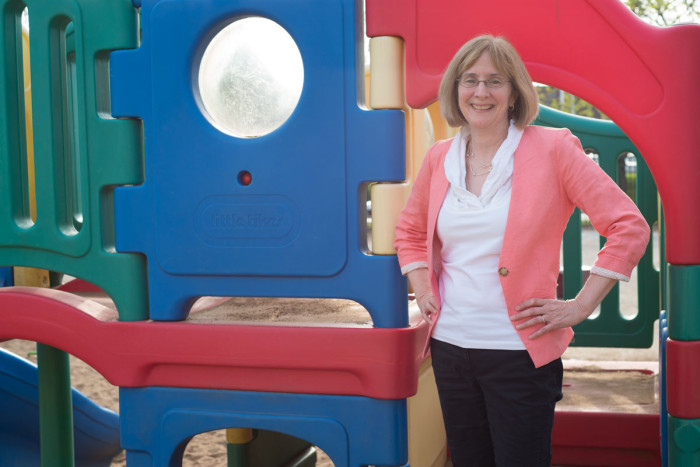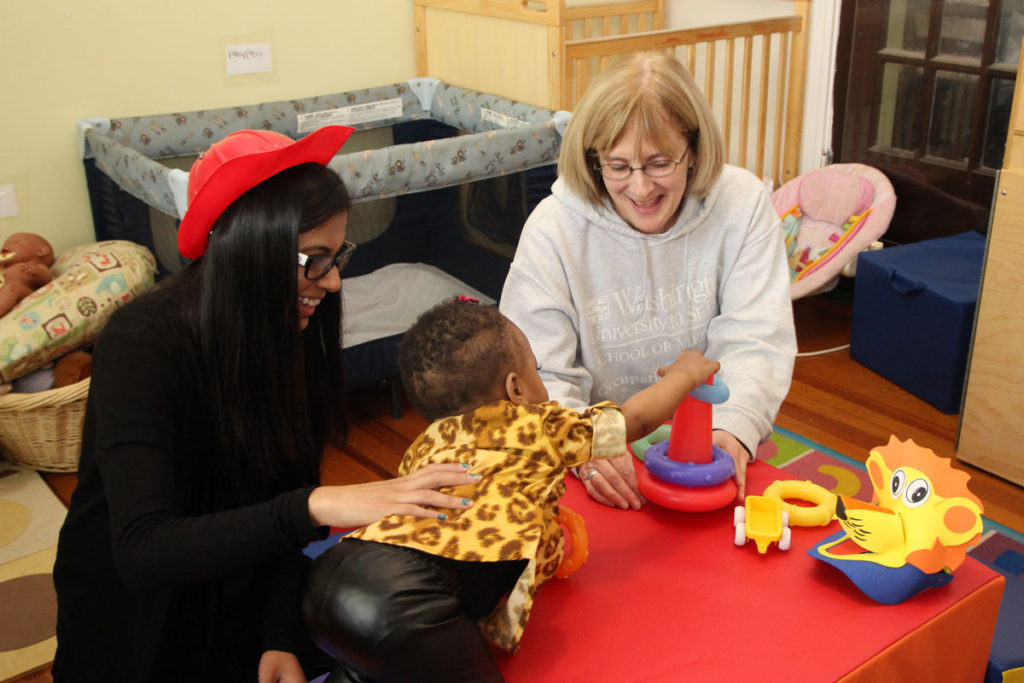
Christine Berg loves a good conversation. And that’s beneficial for Washington University School of Medicine’s Program in Occupational Therapy, since Berg has talked her way into partnerships with more than 100 St. Louis social service agencies.
These partnerships benefit communities while also offering the university’s students in occupational therapy invaluable training.
When Berg, an associate professor of occupational therapy and of neurology, approaches organizations, she often starts by explaining just what occupational therapy can bring to an agency and the people it serves.
“We define occupational therapy as a health discipline – not something that is solely dealing with disabilities,” said Berg, who has been with Washington University’s program for nearly 30 years.
Berg’s explanations are helpful and sometimes necessary. Not that long ago, the field was markedly different. Berg has been part of the change — change she feels has been good for occupational therapy and the many people it helps.
A friend’s suggestion
A native of Foxborough, Mass., Berg decided to pursue occupational therapy after a friend suggested she might like it.
“At the time, occupational therapy involved doing arts and crafts with clients to help them with their rehabilitation.” Berg said. “I’m a quilter, and back then I made my own clothes, so it seemed a natural fit.”
She graduated with a bachelor’s degree in occupational therapy from Tufts University in 1976 and got a job at the Department of Mental Hygiene in New York state.
“It was a pretty exciting time in the field,” she said. “People with developmental disabilities were being reintegrated into their communities from mental health institutions.”
Deinstitutionalization allowed such people to live less isolated lives in community settings. Berg and other occupational therapists were charged with helping them and the communities they were moving into with the transition.
Berg next took a position in Philadelphia. The Pennsylvania Legislature had passed a law determining that preschool children with developmental and physical disabilities would be able to receive services through public school systems.
“We were charged with going out to homes and helping the education system identify children who were going to be attending school, and with suggesting programs for this age group to make the transition easier.”
Her career next led her to Boston University, where she earned a master’s degree in occupational therapy in 1980. The master’s was the most advanced degree available in her field at the time.
A year later, she married John Berg, who will retire in June after leading Washington University’s Office of Undergraduate Admissions for more than two decades. The two met while undergraduates at Tufts and eventually settled in Washington, where Berg worked for the Children’s Hospital National Medical Center. Their daughter, Katie, was born there in 1985.
The family moved to St. Louis in 1987, when John was named assistant to the chancellor at Washington University. That same year, Christine took a position in the university’s Program in Occupational Therapy.
Changing focus
It could be said that her first role in the program was symbolic of major shifts in the field. She was charged with dismantling “the basement,” which referred to an extensive arts and crafts area located within 4567 Scott Ave., a building that later was torn down and replaced with the Farrell Learning and Teaching Center.
“There was a kiln and pottery wheel, floor looms, wood working machines, tons of cherry and oak wood, and students would make these elaborate projects,” Berg recalled. “There were even gasoline engines that students would learn to take apart and put together. It was like Santa’s workshop.”
Having practiced occupational therapy in many community settings, she knew her field was evolving and that there was no place for the services offered in the so-called basement. The health-care climate was changing and occupational therapy was becoming more client- focused.
“We asked clients ‘What do you want to do?’ And the answers had very little to do with the sort of crafts training previous students had experienced,” she said. “Clients wanted help with skills and practical activities that could help them thrive in their personal lives and in their work lives.”
The field has continued to evolve — as has Berg, who in 1999 earned her PhD in social work from the Brown School.
Team approach
“We are preparing our students to realize that their new team members in health care will be community agencies who help get people back on their feet — not necessarily just doctors writing prescriptions for care,” Berg said.
In preparing for such partnerships, students are provided hands-on experience within community agencies. Berg identifies 12 such agencies each spring and coordinates the partnerships.
“Once the agencies agree to participate, each is assigned seven or eight students and a faculty mentor,” Berg said. “Together, they conduct a needs assessment and create programming to help the agency serve its target population.”
Berg and her team of mentors stay in contact with each agency throughout the semester to ensure that participation in the course is useful and sustainable and isn’t burdening the agency.
Currently, Berg is working with two organizations, Beyond Housing and United 4 Children (U4C), focusing on children from birth to age 2. Beyond Housing wants every child to enter kindergarten ready to learn, and to reduce childhood obesity through more opportunities for physical activity. U4C oversees 42 early childhood centers in the Normandy area in north St. Louis County.
Beyond Housing, U4C, early-childhood directors and Berg agreed that a partnership with a physical movement focus from birth to age 2 was important. The early-childhood centers are helping the youngsters move more throughout the day to establish lifelong routines and the expectation that movement is healthy and fun.
The results so far are positive.
“Teachers who have the program love it, and those who don’t, want it, so there’s definitely a need,” Berg said. “Now we move forward and share what we’ve done, hoping to make an impact on even more children, the educators, the parents and the community. We want to make a difference and change lives for the better.”

Comments and respectful dialogue are encouraged, but content will be moderated. Please, no personal attacks, obscenity or profanity, selling of commercial products, or endorsements of political candidates or positions. We reserve the right to remove any inappropriate comments. We also cannot address individual medical concerns or provide medical advice in this forum.